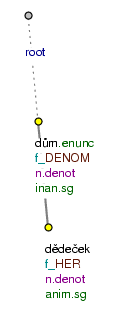- Definition of the functor
HER -
The functor
HER(heritage) is a functor for a free modification denoting usually a person (but also a group of people, institution, time) after which some other subject has inherited, adopted some object of material or abstract nature.
The inherited object is transferred from the ownership of one subject to the ownership of another subject either by the event of the first subject (original owner) losing the object and the other getting it (in cases of material objects), or the "inherited object" is "copied" from one subject to the other (usually in case the object is abstract). As a result of the process, the inherited object can be also affected by some kind of change, or it can be created in the process of heritage.
A modification with the functor HER can modifiy verbs (e.g.: jmenovat se po babičce.HER (=be named after one's grandmother)) or nouns (e.g.: jméno po babičce.HER (=name after gramndmother)).
Forms. HER modifications are mainly expressed by the preposition po+6 (e.g.: dům po dědečkovi (=lit. house after grandfather), zůstalo nám to po něm (=it was left after him)); with the noun dědictví (=heritage), they can also be expressed by a noun in the genitive case (je to dědictví komunistického režimu (=it is a heritage of the communist regime)):
-
prepositional phrase.
The most common forms:
po+6 Nikdy svůj vdovský status neporušila a po Juliu Fučíkovi pobírala 320 korun vdovské penze. (=She never disobeyed her status of a widow and she received a widow's pension of 320 crowns after Julius Fučík.) podle+6 Jmenovala se Barbora podle patronky horníků. (=She was named Barbora after the benefactress of miners.) Examples:
dům po dědečkovi.
HER(=house after grandfather) Fig. 7.52Operu Národního divadla povede po Herrmannové.
HERdirigent Jiří Bělohlávek. (=JB will conduct the Opera of the National Theatre after Hermannova)obrovský nemovitý majetek zděděný po Revolučním odborovém hnutí (=large real estate property inherited after the Revolutionary labour union).
HERPes Blackie zdědil po svém pánovi J. Goodchildovi.
HER33 tisíc dolarů. (=The dof Blacky inheritied after his lord J. Goodchild 33 thousand dollars.)Zůstal zde majetek po třech a půl miliónu.
HERNěmců. (=The property after 3,5 millon of Germans was left here.)
Border with the functor ORIG. Modifications with the functor HER can border especially on ORIG modifications. The ORIG modification is an argument - with verbs - unlike the modification with the functor HER. Distinguishing these two functors is more complicated if they modify noun, as ORIG is an adjunct functor with them (see Section 2.3.2.3.2, "Origo as a modifier of nouns").
Compare:
-
Jméno dostala holčička po kmotře.
HER(=lit. The_name was_given the_girl after the_godmother.)The modification po kmotře (=after the godmother) denotes a person, from whom another person (the girl) inherited an object of abstract nature (name; the girl's name is the same as the godmothers' name). The modification is not a part of the valency frame of the verb, therefore it is assigned the functor
HER. -
Jméno dostala holčička od kmotry.
ORIG(=lit. The_name was_given the_girl from the_godmother.)The modification od kmotry (=from the godmother) denotes a person, who is an author of the girl's name (the name of the girl can be, but not necessarily is, the same as the godmother's name). The prepositional phrase od+2 (=from + 2) after the verb dostat is a valency modification. Therefore, the modification od kmotry (=from the godmother) will be assigned the functor
ORIG, even if the construction is meant to express rather the meaning of heritage (the speaker wanted to express that the girl's name is the same as the godmother's name).
Similarly:
-
Po otci.
HERdostal Karel zimník. (=lit. After (his) father got Karel a_wintercoat.) -
Od otce.
ORIGdostal Karel zimník. (=lit. From (his) father got Karel a_wintercoat.) -
Od otce.
ORIGdostal Karel po dědovi.HERzimník. (=lit. From father got Karel after grandfather a_wintercoat.)
!!! The HER functor is rather marginal.The annotation has shown that the definition of this functor does not distinguish it sufficiently from the functor ORIG. It is necessary to make the definition of the functor HER clearer in the future.
